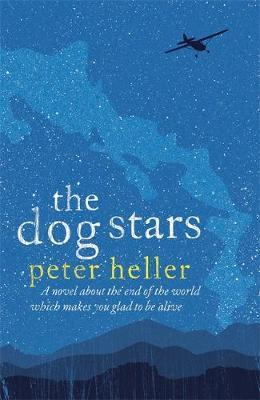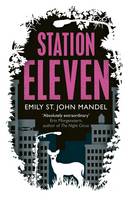Talk to me about the end of the world; about plagues and the collapse of civilisation. Talk to me about fame and dead ends and the different ways people find themselves stranded; talk to me about the art people make in order to stay alive, stay human, because survival is insufficient.
This is Emily St John Mandel's latest book, Station Eleven, opens a new window. Full disclosure, I had not heard of Emily St John Mandel before I opened the programme for the Auckland Writers Festival, but the synopsis of her book grabbed me. Set in part twenty years after the end of the 'era when it was possible to press a series of buttons on a telephone and speak with someone on the far side of the earth' and in partly in the time before, Station Eleven is almost definitely going to make it into my Best Books of 2015, opens a new window list.
This has to be one of my favourite images out of everything I've read this year: Because survival is insufficient, painted on the side of a caravan twenty years after a strain of the flu wiped out most of human life on earth. A Star Trek quote (Seven Of Nine), painted on the side of a old, stripped down pick up truck, the dead weight of its mechanical guts torn out, now pulled by horses, transporting a young woman in a cotton dress with knives on her belt. She's part of the Travelling Symphony, who are rehearsing lines from Shakespeare for their next performance which may or may not be for a doomsday cult that has (naturally) sprung out of this dire and beautiful landscape.
Art is a lot of things, but sometimes I think the art (literature, music) that gets the best reaction out of me is art that is fiercely about survival. The landscape of Station Eleven reminds me of the abandoned and terrifying landscape The Walking Dead, opens a new window (minus the zombies) and the people; the wonderful, surprising and sometimes equally terrifying people. That's a lie - the people are always more terrifying than the landscape. Creepy children as sentries for doomsday cults? Sign me up!
Yet there are stories woven in about little things - comparatively little things when you hold them up against a story about the end of the world. Stories about actors struggling with fame and relationships breaking up, and yet not once did I find myself thinking get back to the post-apocalyptic acting troupe because Emily St John Mandel's writing is so captivating. These little, apocalyptic moments echo the greater apocalypse to come, yet are by no means overshadowed by it.
Emily St John Mandel (St John is her middle name, says her website: you can find her books shelved under M) spoke at the Auckland Writers Festival today. She talked about the inspiration for Station Eleven; how she wanted to write about this incredible world we live in, the global scope of our lives, all the technology that connects us across oceans and borders and huge distances. A very powerful way to write about this, though, was to write about its absence.
What would the world be like without any of this technology? How stranded our lives might become. How local.
Unlike a lot of other post apocalyptic fiction, Station Eleven is set when the world has had a little time to settle down. Mayhem, Emily says, isn't a sustainable way of life. She didn't feel the need to detail every horror, as she believed that what the audience could imagine is as dark as anything she could write.
This absence of the gritty details, and the hints she drops about what those details are, makes for some perfectly unsettling images, some of which are going to haunt me for a very long time.
It's not all dark though. Despite having killed more than 99% of the human population, the book is scattered with lighter, funny moments. Despite being haunted, I laughed. The darkness and the humour complement each other wonderfully.
At the end of her session, she answered some questions. One from the audience was: Why is post apocalyptic fiction so popular these days? There are lots of theories Emily has heard over the years. Part of it might be the dire times we find ourselves in, with the ever growing reality of climate change, with debts that will take a lifetime to pay off, with technology bringing every detail of distant disasters directly into our daily lives. Part of it might be because humans have believed that the world is ending for as long as we have been aware of ourselves; it's a little narcissistic, yes, but very human to think that we are living in the most important age of history.
Another part of it, though, might come from a kind of human restlessness. We have mapped out the globe, and there are very, very few places where we can move to make an entirely fresh start. Post apocalyptic fiction gives us an entirely new beginning, with none of the hangovers from the old world.
It was an excellent talk. Emily St John Mandel speaks beautifully, she is warm and gracious, drawn to dark subjects and the sparks of human light that can be found within them. She's the winner of the 2015 Arthur C Clarke award, author of four books, and writes for The Millions, opens a new window (I can particularly recommend her essay on book titles "The ___'s Daughter, opens a new window", because things like trends in book titles excite me. Also there are graphs!)
 As if it wasn't obvious already, I highly recommend Station Eleven, but if you are looking for more, Emily herself recommends Dog Stars, opens a new window by Peter Heller, a book to which she owes a great amount of inspiration.
As if it wasn't obvious already, I highly recommend Station Eleven, but if you are looking for more, Emily herself recommends Dog Stars, opens a new window by Peter Heller, a book to which she owes a great amount of inspiration.
- Read our other Auckland Writers Festival blogs posts, opens a new window.
- Our page on the Auckland Writers Festival, opens a new window.
Tweets
Signing queue for Emily St John Mandel. #awf15 ^DR pic.twitter.com/T7zgaOTvuo
— Ngā Kete Wānanga o Ōtautahi (@ChristchurchLib) May 15, 2015
As always, @nzdodo did a beautiful job of hosting today's conversation with Emily St John Mandel - and all without spoilers! #awf15
— Marianne Elliott (she/her) (@zenpeacekeeper) May 15, 2015
https://twitter.com/lightyouonfire/status/598699190974197760
Station Eleven by Emily St John Mandel has won this year’s Arthur C Clarke award for science fiction http://t.co/PnKF1oIUg2 #book #awards
— ALIA (@ALIANational) May 7, 2015
Falling back in love with the world, thanks to Emily St John Mandel's Station Eleven http://t.co/w0igEaHoyw
— Tracey Thorn (@tracey_thorn) May 15, 2015



Add a comment to: Survival is insufficient – Emily St John Mandel at the Auckland Writers Festival